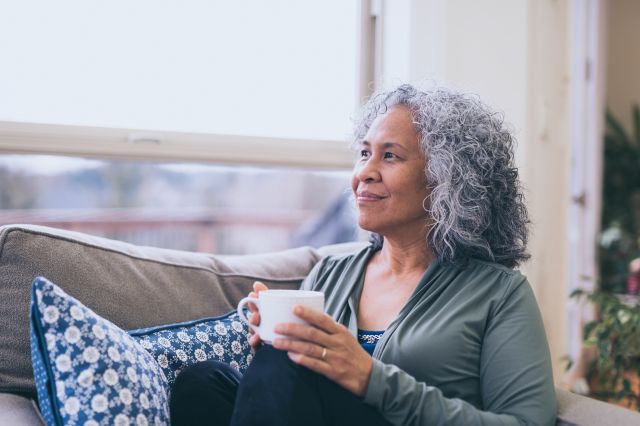Updated on July 22, 2024.
In recent years, the country has been gripped by a number of challenges: the COVID-19 pandemic, economic uncertainty, and extreme weather events, to name a few.
It may feel difficult to express thanks during times like these. But this is exactly the reason why it’s essential to focus on gratitude when you can, says Robert Emmons, PhD, a professor of psychology at UC Davis and author of The Little Book of Gratitude: Create a Life of Happiness and WellBeing By Giving Thanks.
“It is precisely under crisis conditions where gratitude achieves its maximal power,” he says. “It has the power to energize, heal and bring hope.”
Gratitude means more than you think
Gratitude is not just being thankful for what we have, according to Emmons. “It’s an affirmation of the goodness in one’s life and the recognition that the source of that goodness is at least partially outside the self,” he explains.
You can feel gratitude for tangible things—the roof over your head and the food on the table in front of you. But you can also be grateful for intangibles—the love of your family and the beauty of nature outside your window.
Gratitude isn’t limited to the best of times. You can feel grateful even when things are not going well. This humble acknowledgment of the good in your life and in the world can help by connecting you to something larger than yourself, Emmons points out. This could mean different things for different people—humanity, nature or a higher power, he explains.
Multiple studies over many years have shown that gratitude can “significantly and sustainably increase joy, strengthen relationships, facilitate effective coping with stress and promote physical well-being,” Emmons adds.
So while it is natural to reflect on what you may have lost or missed during challenging times, try to also feel grateful for what you have. You can do this every day—not just when festive decorations are up and there are holiday dishes on the table.
Fostering an attitude of gratitude can help you reap many benefits for your mind as well as your body, including the following.
You’ll likely be happier
In numerous studies, Emmons and his colleague Michael E. McCullough, PhD, have found that the practice of gratitude leads to greater feelings of happiness and well-being.
“Gratitude heals past hurts, current pains and future anxieties,” Emmons says. It allows us to live in the present while blocking negative emotions such as anger, regret and resentment. “It’s impossible to feel envy and gratitude at the same time,” he notes.
You may be healthier
Letting feelings of gratitude wash over you can literally make you feel better. In one January 2013 study published in Personality and Individual Differences, people who practiced gratitude were found to have fewer aches and pains. It’s possible that this link was partly because these people were also more likely to participate in healthy activities and to seek out medical help for health concerns.
Thankfulness may be good for your heart, too. A 2023 review of research on gratitude and heart health published in Frontiers in Psychology concluded that being grateful is a low-cost intervention that can lead to better outcomes for patients living with heart disease.
There is evidence that gratitude is associated with lower levels of inflammation and better heart health.
“Indeed, gratitude is good medicine,” Emmons says.
You’ll probably sleep better
Writing down what you’re thankful for can help ease your mind and promote quality sleep. A July 2016 study published in The Journal of Positive Psychology monitored the sleep of people who suffered from anxiety or depression. Those who made a practice of writing in a gratitude journal for three weeks reported having less trouble sleeping, as well as lower measures of stress, depression and anxiety. Three weeks later, the participants’ sleep and depression scores returned to their original levels, but their stress and anxiety scores improved even more.
You could cultivate stronger relationships
It makes sense that taking the time to appreciate the people close to you can help those relationships grow stronger. In one May 2010 study published in Personal Relationships, researchers looked at 65 couples in committed relationships and discovered that when one partner expressed gratitude toward the other, they felt a closer connection and more relationship satisfaction through the following day.
Another large October 2018 study published in Psychology, Health & Medicine made the connection between gratitude and decreased levels of perceived loneliness and stress—which, in turn, led to improved self-reported physical health symptoms.
“Gratitude is the all-purpose glue that squeezes into the cracks between people, strengthening and solidifying these relationships,” Emmons says. “As the fuel that keeps us going, gratitude prevents our relationships from sputtering and conking out.”
You’ll likely feel more optimistic
Having a positive outlook about the future is something we could all use during and after tumultuous times. In one of Emmons’ earlier studies published in the Journal of Personality and Social Psychology in 2003, he and his colleagues asked one group of college students to make a list of what they were grateful for every day. Meanwhile, another set of students were asked to make a list of the things that irritated or annoyed them. After nine weeks, the group that had focused on gratitude reported feeling better about their lives in general. They were also more optimistic about the future.
In a subsequent study published in the Journal of School Psychology in 2008, Emmons found similar results among middle-school students.
This practice of “counting your blessings instead of your burdens,” he says, is a key to enhancing your quality of life.







